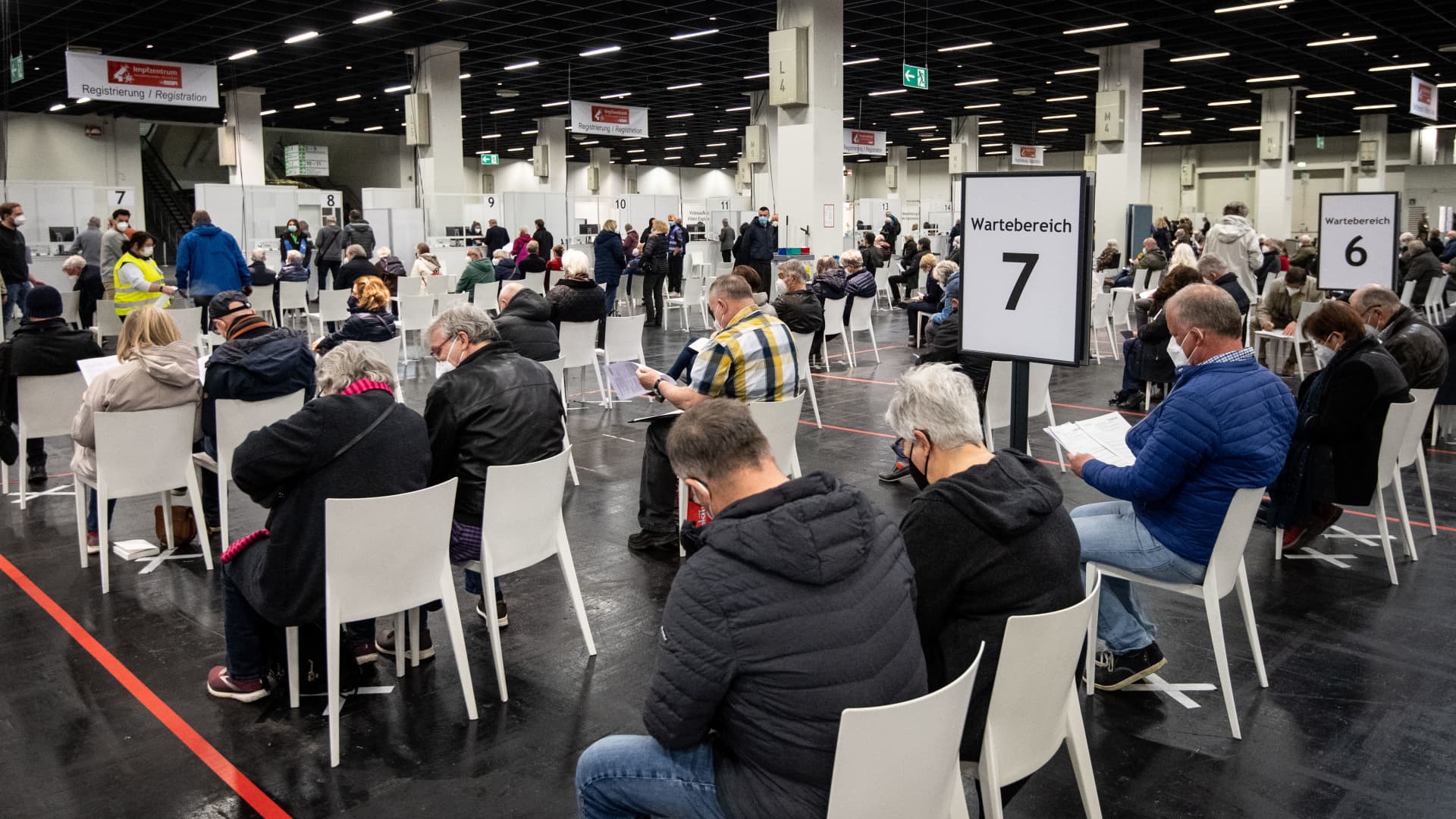
- The Oxford-AstraZeneca shot has been dogged by safety concerns in recent weeks, with several European countries briefly suspending their use of the vaccine last month.
- The World Health Organization, the U.K.'s medicines regulator and the International Society on Thrombosis and Hemostasis have all said that the benefits of administering the Oxford-AstraZeneca shot far outweigh the risks.
- AstraZeneca has previously said its studies have found no higher risk of blood clots as a result of its vaccine.
LONDON — Europe's medicines regulator found a possible link between the coronavirus vaccine developed by AstraZeneca and the University of Oxford and rare blood clotting issues — though it said the benefits of getting the shot still outweigh its risks.
Unusual blood clotting with low blood platelets will be added as a "very rare" side effect to the vaccine's product information, along with a slew of other possible adverse reactions, Emer Cooke, executive director of the European Medicines Agency, said in a televised news conference Wednesday.
The warning comes after the regulator's safety committee reviewed extremely rare cases of unusual blood clots in some people vaccinated with the Oxford-AstraZeneca shot. Most of the cases occurred in women under 60 within two weeks of the shot, officials said. The EMA hasn't yet identified specific risk factors that contributed to the phenomenon.
Get Boston local news, weather forecasts, lifestyle and entertainment stories to your inbox. Sign up for NBC Boston’s newsletters.
Researchers also don't know what's specifically causing the blood clots, but one plausible explanation is that the vaccine causes an immune response in some people that's similar to one seen in patients treated with heparin, which is called heparin-induced thrombocytopenia, Cooke said.
Money Report
"This case clearly demonstrates one of the challenges posed with large-scale vaccination campaigns," she said. "When millions of people receive these vaccines, very rare events can occur that were not identified in the clinical trials."
Separately, the U.K.'s medicine regulator said on Wednesday that it also identified a possible link between the shot and the rare blood clots. The Medicines and Healthcare products Regulatory Agency, or MHRA, similarly said the benefits of the Oxford-AstraZeneca vaccine outweighed the risks for most people.
Britain's Joint Committee on Vaccination and Immunisation said people under 30 who don't have any underlying health conditions should get a different vaccine if possible.
Other side effects
The EMA, which flagged other possible side effects, added that it was of "great importance" that health-care professionals and people receiving the Oxford-AstraZeneca vaccine were aware of the risks and to watch for possible symptoms that typically occur in the first two weeks after inoculation.
"These include, for example, shortness of breath, chest pain, swelling in the leg, persistent abdominal pain, neurological symptoms including severe or persistent headache or blurred vision and skin bruising beyond the site of injection," Dr. Sabine Straus, chair of EMA's safety committee, said at the same news conference. Those side effects will be listed as possible adverse drug reactions on the vaccine's product information, she said.
Shares of AstraZeneca closed down around 1% in London.
Professor Jonathan Van-Tam, the U.K.'s deputy chief medical officer, described the country's new advice on the Oxford-AstraZeneca vaccine as a "course correction" for the U.K.
The MHRA, the body that approved it for use in the U.K., has been looking at the data following the reports — both in the U.K. and in continental Europe — of serious but rare blood clots, some of which have been fatal.
A U.K. trial of the Oxford-AstraZeneca vaccine on children had already been paused while the medicines regulator investigated a possible link between the shot and the blood clotting disorders, specifically, cases of blood clots in veins within the brain, known as cerebral venous sinus thrombosis (CVST) as well as thrombocytopenia (low levels of blood platelets which help the blood to clot).
The U.K. government noted that, up to and including March 24, there had been 22 reports of CVST and eight reports of other thrombosis events with low platelets, out of a total of 18.1 million doses of the AstraZeneca vaccine (a two-dose shot) given by that date.
Ongoing safety concerns
The Oxford-AstraZeneca shot has been dogged by safety concerns in recent weeks, with several European countries briefly suspending their use of the vaccine last month.
The EMA said on March 31 that it had found the shot to be safe and effective, but added it could not rule out the possibility of a causal link between the vaccine and clotting events so would continue to investigate.
The World Health Organization, the U.K.'s medicines regulator and the International Society on Thrombosis and Hemostasis have all said that the benefits of administering the Oxford-AstraZeneca shot far outweigh the risks.

AstraZeneca has previously said its studies have found no higher risk of blood clots as a result of its vaccine.
Most countries have since resumed use of the shot but many have suspended inoculations across certain age groups.
The EMA had denied any known link between the Oxford-AstraZeneca shot and rare blood clots before Tuesday when a senior official at Europe's medicines regulator reportedly said there is a clear "association" between the Oxford-AstraZeneca vaccine and very rare blood clots in the brain.
In an interview with Italian newspaper Il Messaggero published Tuesday, Marco Cavaleri, chair of the EMA's vaccine evaluation team, said: "In my opinion we can now say it, it is clear that there is an association with the vaccine. However, we still do not know what causes this reaction."
— CNBC's Holly Ellyatt contributed to this report.






